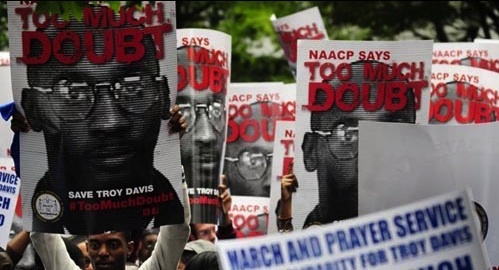Troy Davis protesters occupy Wall Street

Less than twenty-four hours after the state of Georgia injected a cocktail of lethal drugs into the bloodstream of Troy Anthony Davis, the repercussions of his death hit the streets of New York City last Thursday with full force. A rally that was billed online as a "Day of Outrage," lived up to the name as it snowballed into a massive impromptu march through lower Manhattan.
People young and old, of all classes and colors, joined hands in a moment of silence to honor a man whom many believed died for a crime he didn't commit. Some cried, many chanted. With references to Jim Crow and legalized lynching, the collective indignation was palpable. There were impassioned monologues from anti-death penalty advocates, poets and people who simply found themselves moved by the moment.
With little warning, the crowd, numbering in the high hundreds, decided to march. The destination was unknown but the resolve was clear. The police did their best to keep up as the mass of mourners moved west down 14th Street, then south onto 5th Avenue.
Parents marched with children on their shoulders. Crust-punk activists joined demonstrators in pressed shirts, repeating the refrain, "The system is racist, they killed Troy Davis!" Wide-eyed Manhattanites poured out of restaurants and businesses, camera phones in hand, to capture what was unfolding.
As the number of marchers swelled it became evident that some of the spectators had transformed themselves into participants.
With steadily increasing numbers -- some estimate over a thousand -- and a phalanx of marching and scooter-mounted cops on its tail, the sea of demonstrators continued south. Word soon spread that the demonstration knew where it was headed: Wall Street.
Occupy Wall Street
For the last week an encampment of protesters executing a campaign known as Occupy Wall Street have taken up residence at Trinity Place, a square roughly a thousand feet from the very heart of global capitalism. They've renamed the space Liberty Plaza, and targeted their frustration at a number of issues, including corporate greed and the unyielding influence of moneyed interests on the U.S. political system.
Illuminated by street lamps and police lights, the throng of Davis supporters was met with cheers and music provided by an estimated 500 Wall Street protesters. Within minutes dozens of NYPD officers were attempting to physically force scores of demonstrators onto a strip of cement already packed shoulder-to-shoulder with people.
Protester Brandon King, 27, found himself caught between the police and the crowd. With his back turned to the officers, King was yanked from the crowd and slammed into the pavement; arrested on charges of obstruction of governmental administration, disorderly conduct and resisting arrest. King denies that he resisted, saying he went limp while officers punched him in the back.
His arms bleeding, he was dragged away as a demonstrator screamed, "The whole world is watching!" Indeed, there was no shortage of recording equipment documenting the moment.
One young man, in an apparent attempt to put the situation in context, cried out to the police, "These people are marching peacefully for a dead man!"
Joseph Jordan, 29, says he received similar treatment. He claims a senior police officer singled him out, saying "I'm sick of you." A number of officers then piled on top of him, making it impossible to scream or breathe, he says.
"I feel that their immediate response to us was that, 'We don't care about your anger. We don't care about your frustration. We don't care about Troy,'" King said, following his release from jail the next day.
Despite the heavy-handed tactics of the police, the demonstrators remained resolute and non-violent. Their numbers inflated by the Liberty Plaza crowd, the group decided to continue the march to Wall Street itself.
A Surreal Scene
The shouts of the protesters, the rapid-fire tapping of a snare drum and the unavoidable presence of Federal Hall's famous George Washington statue made for a surreal scene. What could have been a profound moment to reflect on democracy in action turned ugly when a hulking police officer grabbed a young woman by the back of her neck, yanked her over a metal barrier and slammed her into the ground, her skull smacking against a curb.
A second officer then picked up Saman Waquad and tossed her back over the barricade where her back slammed into a cement stair. The crowd erupted in anger, chanting "Who do you protect?" over and over.
Waquad -- who attended the Troy Davis rally after years of following his story -- says that two officers were involved in grabbing and tossing her against the steps in front of the federal building.
"Honestly, I'm five feet tall and I weigh a hundred pounds. I don't know at what point somebody thought that I would be a physical threat to a cop. All I was doing was taking pictures of them brutally grabbing somebody from the crowd," the 28-year-old said.
"As somebody who lives in this country and pays taxes, I have the right to be able to peacefully protest an injustice," she added.
An Emboldened Movement
Moments later, a senior NYPD police officer announced that anybody still on Wall Street after five minutes would be subject to arrest.
The protesters filed back in and suddenly the plaza -- which has been criticized as the project of over-educated white kids -- began to show signs of the diversity it has so sorely lacked.
The reaction of the NYPD Thursday night was predictably overzealous and needlessly violent. What wasn't expected, however, was the spontaneous merger of two growing struggles. One group has taken to the streets out of frustration with an economic status-quo they say leaves too many with not enough. The other has voiced outrage over a so-called justice system that disproportionately targets, imprisons and kills people of color.
Both are struggles against marginalization. Both are refusing to remain silent.
They have now marched together, stood up to the police together and been arrested together. Such experiences can create formidable bonds. In its attempt to suppress popular dissent, the NYPD may have just emboldened a movement.
Ryan Devereaux is a Democracy Now! news production fellow and an independent journalist.
Follow him on Twitter @RDevro. Photo by Devereaux via New America Media.
